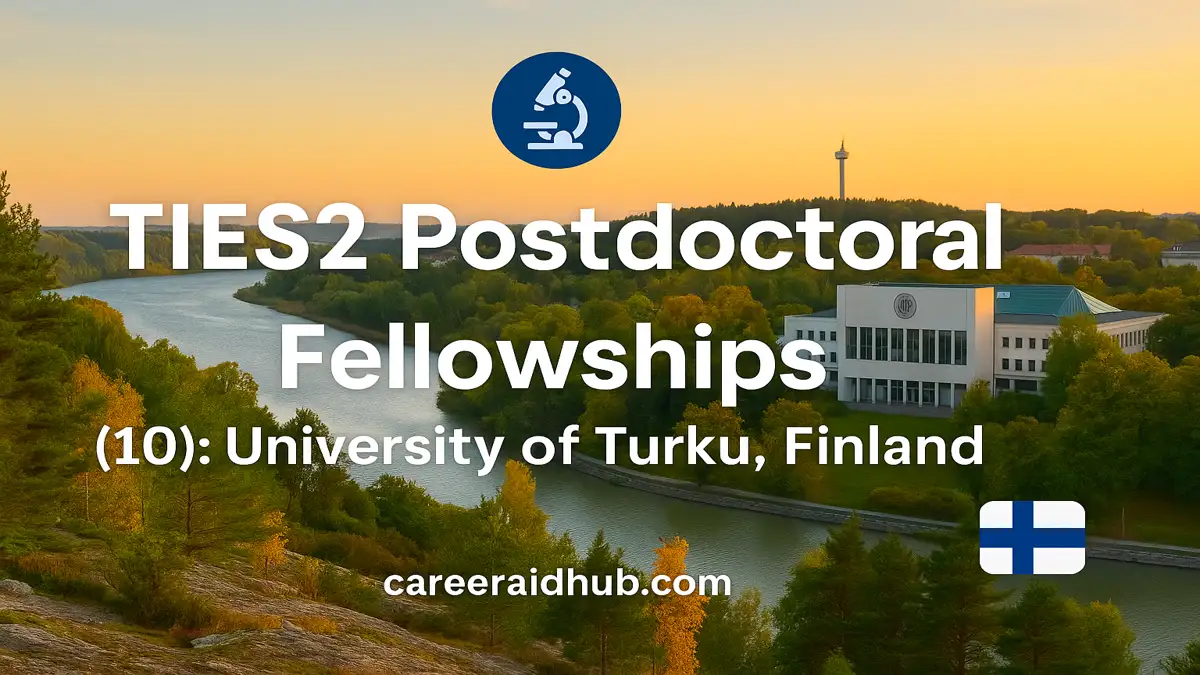Overview: Why Look at ETH Zurich for PhD and Postdoc Positions?
ETH Zurich is widely recognised as one of Europe’s leading universities for science, technology, engineering, and mathematics, and it is also a major research employer within Switzerland. The institution brings together more than 12,000 employees from over 120 countries, which creates a genuinely international academic and research environment. As a result, ETH Zurich offers a substantial number of research-focused positions across core STEM subjects and an expanding portfolio of interdisciplinary fields that connect engineering, natural sciences, social sciences, and public policy.
ETH Zurich in Switzerland offers fully funded PhD positions and competitive postdoctoral research jobs across engineering, natural sciences, computer science, and interdisciplinary fields. International graduates receive salaried roles, world-class supervision, and access to advanced laboratories while building strong academic or industry careers through the official ETH Zurich jobs portal for global research talent.
PhD Opportunities at ETH Zurich
How ETH Doctorates Are Structured
ETH Zurich primarily offers individual doctorates rather than a centrally managed doctoral school. Each doctoral candidate is hosted in a specific chair, institute, or research group and works under the academic guidance of one or more professors. In practice, this model means that supervisors recruit and mentor their doctoral candidates directly, forming research teams
Several structural features are particularly important for prospective applicants:
-
- You must secure a professor willing to supervise your thesis project, as supervision by an ETH faculty member is a formal prerequisite for admission to doctoral studies.
- Doctoral studies typically require three to four years of full-time research and culminate in the title Doctor of Sciences (Dr. sc. ETH Zurich), following successful thesis submission and defence.
- In most cases, doctoral students are employed by ETH Zurich on a salary, rather than following an unfunded or tuition-only scholarship model.
Because of this employment-based system, doctoral candidates at ETH Zurich function as junior researchers and often contribute to funded research projects while developing their own dissertation. This arrangement provides financial stability, offers structured integration into a research group, and supports the development of a strong publication and skills profile.
Finding a PhD Position
You can identify PhD (Doktorierende) positions at ETH Zurich in two main ways. Using both approaches in parallel usually produces the best results.
-
Open PhD vacancies on the ETH jobs portal
- Apply filters for “Doktorierende,” and then narrow the search by department, research area, or specific keywords. This approach helps you identify formally advertised PhD positions and submit applications directly through the onlineportal.
- Apply filters for “Doktorierende,” and then narrow the search by department, research area, or specific keywords. This approach helps you identify formally advertised PhD positions and submit applications directly through the online
-
Directly contacting potential supervisors
- ETH Zurich notes that supervisors may recruit doctoral candidates directly, even for newly funded projects. So, it helps to check departmental sites, group pages, and recent papers, then contact suitable professors with a focused email and brief research interest statement.
Postdoctoral Opportunities at ETH Zurich
Regular Postdoc Positions
Postdoctoral positions (Postdoktorierende) are advertised via the same ETH jobs portal and appear regularly throughout the year. These posts are usually:
-
- Fixed-term, often for two to three years, although the precise duration may vary by project, funding scheme, and discipline.
- Fully salaried, with compensation determined according to ETH Zurich’s salary scales and Swiss employment regulations.
Across ETH Zurich, you will find postdoctoral research jobs in a broad range of fields, including:
-
- Engineering and materials science
- Computer science, artificial intelligence, and data science
- Environmental and earth sciences
- Life sciences, health, and nutrition
- Social sciences, science and technology studies, and policy-related research
Because many postdoctoral roles are linked to specific research grants or larger collaborative programmes, the job
ETH Postdoctoral Fellowships (ETH Fellows)
-
- Support for early-career researchers who design an independent research project to be hosted by an ETH Zurich professor or research group, thereby strengthening their academic profile.
- A notable proportion of former ETH Fellows progress to professorships or senior research roles, highlighting the programme’s impact on long-term career development.
If you are aiming for highly competitive postdoctoral funding that enhances your CV, it is
Career Support for Postdocs
ETH Zurich also offers information events and career development activities tailored specifically to postdoctoral researchers. These initiatives cover topics such as academic career planning, transitions into industry or consulting, and roles in policy or international organisations. They frequently also address cross-cutting skills, including grant writing, project management, teaching, and leadership.
Engaging with these resources helps postdocs to broaden their career options, better understand the Swiss and European research ecosystems, and build networks that extend beyond their immediate research group or department.
Typical Eligibility and Profile
For PhD Positions
While exact admission requirements for doctoral positions vary by department and research group, the following criteria are commonly expected for PhD jobs at ETH Zurich:
-
- A Master’s degree (or equivalent) in a discipline that directly aligns with the advertised project or research area.
- Strong academic performance and demonstrable research potential, often evidenced by a well-executed Master’s thesis, publications, or consistently high grades.
- A good command of English, as it is widely used as a working language in research groups; in some areas, knowledge of German can be an advantage or a formal requirement.
Additional elements that strengthen an application include:
-
- Prior research experience, such as a strong Master’s thesis, research internships, or co-authored publications.
- Relevant technical skills, such as programming, quantitative methods, or experimental lab techniques, depending on the field.
- Clear and well-motivated interest in undertaking independent research over a three- to four-year period, and a willingness to contribute actively to the research group’s broader activities.
Since PhD candidates are junior researchers, hiring committees assess not only academics but also teamwork, reliability, and long-term commitment to research.
For Postdoc Positions
Postdoctoral positions at ETH Zurich typically require:
-
- A completed PhD in a closely related field, or a dissertation that is near completion at the time of application.
- A solid publication record appropriate to the discipline, demonstrating research independence and the ability to lead or drive individual projects within a larger research agenda.
- Methodological expertise or technical skills that are clearly aligned with the advertised project, such as advanced experimental methods, specialised computational techniques, or interdisciplinary integration capabilities.
Experience supervising students, collaborating across institutions, or contributing to grants is a strong advantage. So make sure to highlight these in your CV and cover letter when applying for postdoc roles at ETH Zurich.
Practical Tips for Applicants
-
- Start from the official ETH jobs portal and treat it as your primary reference, even if you first encounter a vacancy through an external academic job board.
- Read each job description carefully and adapt your CV, cover letter, and research statement to match the specific project, department, methods, and skills outlined.
- Contact potential supervisors early, especially when you are interested in forthcoming or not-yet-advertised PhD openings, and send a concise, well-structured email that demonstrates familiarity with their recent work.
- For ETH Postdoctoral Fellowships and other competitive funding schemes, plan at least six to twelve months in advance, as you will need sufficient time to refine your research proposal, secure a host, and gather strong references.
Program Snapshot
|
Feature |
Details |
|
Program Name |
PhD and Postdoctoral Research Opportunities at ETH Zurich |
|
Host Country |
Switzerland (primarily Zurich, with additional associated locations) |
|
Funded By |
ETH Zurich and externally funded research grants |
|
Duration |
Typically 3–4 years for PhD positions; usually 1–3 years for postdoctoral appointments |
|
Study Mode |
Full-time, campus-based research employment; some groups may offer limited hybrid flexibility depending on project needs |
|
Eligibility |
Qualified national and international candidates with a relevant Master’s degree for PhD roles or a completed PhD for postdoctoral positions |
|
Financial Support |
Competitive ETH salary scales, social security benefits, and, in many projects, conference and research travel support |
|
Fields of Study |
Engineering, natural sciences, computer science, mathematics, architecture, life sciences, environmental sciences, social sciences and related disciplines |
|
Deadline |
Rolling recruitment; major cycles expected around March 2026 and September 2026 – we will update soon |
|
Official Website |
Click here |
References
[1] Working, teaching and research at ETH
[2] ETH Jobs
Frequently Asked Questions (FAQs)
You apply for a PhD at ETH Zurich through the official jobs portal and, when relevant, by reaching out to potential supervisors with a tailored research profile.
Yes, ETH Zurich employs PhD candidates on paid research contracts, so you receive a salary—not just a tuition waiver—even as an international student.
You typically need a relevant Master’s degree, strong academics, research experience, and good English skills; some programs may also require German or specific technical skills.
Yes, ETH Zurich offers ETH Postdoctoral Fellowships that fund independent research projects hosted by ETH professors, but competition is intense and selection focuses on excellence.
PhD positions typically last three to four years, while postdoctoral contracts usually run for one to three years, depending on funding and project requirements.
Many ETH Zurich PhD and postdoc positions use English as the working language; however, some departments and teaching-related duties may require or prefer German.
International PhD candidates at ETH Zurich usually hold Swiss work contracts, working as researchers while completing their doctorate, subject to visa and permit rules.
You boost your chances by aligning your proposal with a host professor, publishing strong papers, networking early, and submitting a tailored application.










